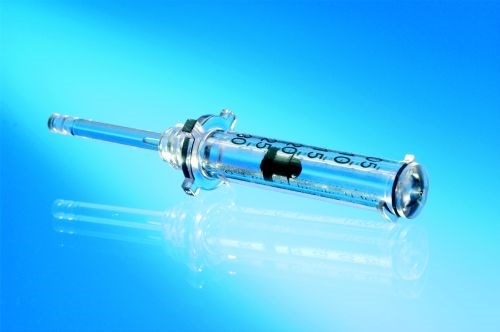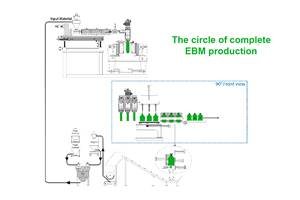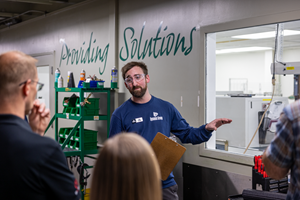“Maybe BPA isn't so bad after all”
That’s how Jon Hamilton, a reporter at National Public Radio’s (NPR) science desk, began his story this week on a new report by government scientists published in the journal Toxicological Sciences, which concludes what many reports on bisphenol A (BPA) already have.

“The plastic additive has been vilified by environmental advocacy groups. But the chemical had no effect on rats fed thousands of times the amount a typical person ingests, government scientists are reporting in the journal Toxicological Sciences.
The results "both support and extend the conclusion from the U.S. Food and Drug Administration that BPA is safe as currently used," says Daniel Doerge, a research chemist with the FDA's National Center for Toxicological Research.
At the MD&M West show in Anaheim earlier this month, and before this latest revelation, I spoke with two of the largest producers of polycarbonate (PC) resins in the world—Bayer MaterialScience and SABIC—about BPA backlash and its knock-on effect on PC, an engineering resin that’s made from a mix of chemicals including BPA. That backlash has led some companies to move away from PC in a variety of markets, including human-contact applications in consumer goods and healthcare, for example.
Bruce Fine, market segment leader, medical and consumer products at Bayer, told me that the FDA continues to assert BPA is safe for the applications and uses it's approved for “despite all the other discussions,” he noted, adding that the agency is also working on a round test, a studies of studies, to further validate the chemical’s safety.
"[BPA fears] are not supported by sound science,” Fine said. “If they were, we would address it accordingly." I asked about an application like baby bottles, which experienced a de facto ban as retailers and brands announced a wholesale shift away from PC, but Fine said that to his knowledge, no domestic producer of the resin had sold PC into the baby bottle market in “years”, calling the “BPA-free” push in that area a "nonevent" for Bayer.
Fine did say Bayer had experienced some cases where OEMs had made the switch away from PC, but it had also seen instances where those same customers switched back.
When asked whether her company is still queried on BPA, Cathleen Hess, SABIC’s Director of Healthcare Marketing at SABIC, was succinct. “Of course [BPA] comes up,” Hess said. “All we’re doing is studying the science, which says it’s safe, so we continue to promote PC in the healthcare industry.”
Maybe this latest study will make those discussions easier for companies like Bayer and SABIC, but maybe not. Perusing the comments below the NPR story, a healthy amount of skepticism about BPA’s safety remained (see below).
Well if the government says so, it must be true. Certainly, they would never allow themselves to be corrupted by the chemical companies that produce BPA. I think I will continue to err on the side of [sic] cautious and avoid exposure to questionable synthetic chemicals that provide no real value to my existence.
In a “background information” piece Bayer distributed at the show entitled “Government funded research supports the safety of bisphenol A”, Bayer noted that the chemical has been subjected to more than 5000 studies that have in turn been reviewed by health and regulatory authorities all over the world. “The newest research results continue to build on the body of evidence indicating the safety of BPA,” the release stated.
Well, we can add another study to that list, but will it be enough to change public perceptions about BPA and PC? That ship might have sailed.
Related Content
Medical Tubing: Use Simulation to Troubleshoot, Optimize Processing & Dies
Extrusion simulations can be useful in anticipating issues and running “what-if” scenarios to size extruders and design dies for extrusion projects. It should be used at early stages of any project to avoid trial and error and remaking tooling.
Read MoreGet Color Changes Right In Extrusion Blow Molding
Follow these best practices to minimize loss of time, material and labor during color changes in molding containers from bottles to jerrycans. The authors explore what this means for each step of the process, from raw-material infeed to handling and reprocessing tails and trim.
Read MoreMedical Molder, Moldmaker Embraces Continuous Improvement
True to the adjective in its name, Dynamic Group has been characterized by constant change, activity and progress over its nearly five decades as a medical molder and moldmaker.
Read MoreUS Merchants Makes its Mark in Injection Molding
In less than a decade in injection molding, US Merchants has acquired hundreds of machines spread across facilities in California, Texas, Virginia and Arizona, with even more growth coming.
Read MoreRead Next
Lead the Conversation, Change the Conversation
Coverage of single-use plastics can be both misleading and demoralizing. Here are 10 tips for changing the perception of the plastics industry at your company and in your community.
Read MoreMaking the Circular Economy a Reality
Driven by brand owner demands and new worldwide legislation, the entire supply chain is working toward the shift to circularity, with some evidence the circular economy has already begun.
Read MoreSee Recyclers Close the Loop on Trade Show Production Scrap at NPE2024
A collaboration between show organizer PLASTICS, recycler CPR and size reduction experts WEIMA and Conair recovered and recycled all production scrap at NPE2024.
Read More


























